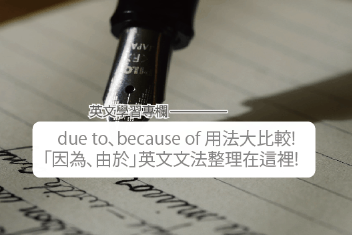1. because (conj.) / because of (prep.)
最常见的「因为」就是because了,关于because有以下几点要注意:
1. because 是从属「连接词」,因此后面要加上一个完整句子,也就是和一般句子一样必须包含有主词、动词。常见同义字有since, as,两者也都是连接词。
2. because 加上了 of 之后变成了「介系词」,因此后面不再连接一个完整的句子,而是必须要加上名词或是动名词。
He got a good grade because/ since he (主词) studied (动词) hard yesterday.
他得到了一个很好的成绩,因为他昨天很用功念书。
Tom cannot go to work because of sickness. (名词)
因为生病,汤姆不能去工作。
2. due to (prep.)
due to 是个「介系词」,因此必须要加上名词,后面不可以连接一个句子。
Anna’s coming to school late was due to the rain (名词). (O)
Anna’s coming to school late was due to it was raining outside. (X)
3. because of 和 due to 到底哪里不一样?
综合上述,because of 和 due to 两者虽然都是介系词,但是他们的用法却有很明显的差异,因此是不可以随便替换的!
因此想要分辨两者的用法,首先得先确认「主句的动词」:

1. 当句子的主动词不是 be动词,而是一般常见的普通动词时,我们要使用 because of,此时 because of 还可以用 on account of 或 in view of 来替换。此时,because of在语意上适用来修饰「动词」的。
Robert cannot go to party because of his work. (O)
(罗伯特因为工作不能参加派对) - 主动词为普通动词 go。
= Robert cannot go to party on account of / in view of his work.
此时,Because of 是用来修饰前面的动词 go to the party,解释罗伯特不能参加派对的原因。
Robert cannot go to party due to his work. (X)
此时使用due to在文法上是错误的,原因如下:
2. 当句子的主动词为 am, is, are, was, were 等「be 动词」时,我们要用 due to,因为due to 仅用于be 动词之后做形容词片语,简单来说是用来说明、形容「名词」的。此时 due to 等同于 caused by, resulting from。例如:
The serious accident was due to his careless driving. (O)
(这起严重意外事故是由于他驾驶疏忽所造成) - 动词为be 动词: was。
= The serious accident was caused by his careless driving.
此时,due to 是用来修饰前面的名词 accident,解释说明意外发生的原因。
The serious accident was because of his careless driving. (X)
4. Owing to
另一个常用的同义词 owing to 看起来和 due to 很像,虽然都是以介系词 to 做结尾,但千万要注意,Owing to跟的用法due to不同,而是跟 because of 一样,和普通动词连用。
Example:
They decide to cancel the flight, owing to the storm.
= Owing to the storm, they decide to cancel the flight.
owing to常见置于句首。
= They decide to cancel the flight because of the storm.
由于暴风雪的缘故,他们决定取消这班飞机。
5. Since(conj)
since 的意思比起表达原因的因为,更适合翻译成「既然」
Since it is so hot, let’s go swimming. 既然天气这么热,我们去游泳吧。
6. As (conj)
As的意思上跟because相同,但要注意的是在句子中,as比较强调的结果的部分;because则比较强调原因;理由(reason)。
I hope they’ve decide to come as I wanted to hear about their India trip.
(我希望他们决定来这,因为我想要听有关他们印度旅行的事。)
— 强调前面有关「结果」的那句:希望他们决定来这。
We’re no dessert in the house because you ate all the ice cream last night.
(在房子里没有甜点,因为你昨晚吃了太多冰淇淋了。)
7. for (conj.)
for 解释作「因为」时是「连接词」,要特别注意的是句子中的 for 前面要加上一个「逗点。
We must start early, for it will take two hours to drive to the airport.
我们得早点动身,因为开车去机场得花两个小时。







